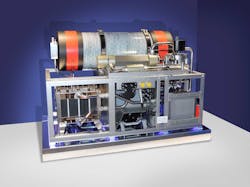The PIPAA Collaborative Project, Led by Safran, Has Received a Grant of €19.3 Million Under the Investments for the Future Program (PIA) Managed by Bpifrance
The PIPAA (Fuel Cells for Aerospace Applications) project aims to develop and qualify a fuel cell system for the electrical power supply of aircraft systems, particularly electric ground taxiing solutions, thus drastically reducing polluting emissions in airports. This project, representing a total investment of €51.6 million over five years, is financed to the tune of €19.3 million by the Investments for the Future Program, led by the Commissariat-General for Investment (CGI) and managed by Bpifrance, within the framework of the “Structural R&D Projects for Competitiveness” call for projects.
PIPAA’s ambition is to develop an autonomous on-board electrical power generation system for medium-haul aircraft and business jets, and to validate the entire hydrogen-power distribution and fueling chain on an airport platform. Compact and lightweight, these electrical power generation systems combining fuel cells and hydrogen tanks will supply specific aircraft loads on the ground and in flight, significantly reducing the aircraft’s environmental footprint.
Safran Power Units, one of the world leaders in the production of power systems for aerospace, is leading this project, which also involves Tronico, Ad Venta and easyJet. These partner companies will contribute in particular to the on-board testing of the developed systems. The industrial partners will be assisted by the technical skills of the French Alternative Energies and Atomic Energy Commission (CEA), the National Polytechnic Institute of Toulouse (INPT) and the French National School of Civil Aviation (ENAC).
The PIPAA project, backed by the HyPort initiative, a meta-project in the Occitania region that aims to make Toulouse-Blagnac Airport the first zero-emissions airport in the world using hydrogen energy, is among the winners of the national “Hydrogen territories” call for projects and is certified by the Aerospace Valley competitiveness cluster.
“Safran Power Units, a Safran Center of Expertise, is a pioneer in the area of fuel cells. This source of ‘clean’ energy is highly autonomous and will eventually be able to operate for the whole duration of a flight, including for long-haul flights at high altitudes. It offers high efficiency and great operational flexibility. Safran Power Units is working with the leading commercial and business aircraft manufacturers on aircraft system architectures to optimize energy management and to integrate this new on-board system, for use both on the ground and in flight. By 2019-2020, fuel cells will be ready for initial commercial applications. We are proud, once again, to innovate for the benefit of our customers,” added François Tarel, CEO of Safran Power Units.
Vincent Fournet, Ecotechnologies Sector Manager at Bpifrance added: “PIPAA systems should be the first commercial applications of hydrogen technologies in aeronautics. They fit perfectly into the dynamics of the sector, with an increasing electrification of aircraft and a strong demand for the reduction of environmental impacts. The recognized expertise of Safran and its partners are undeniably strong points for achieving the ambitious objectives of this project.”
Bpifrance is the managing operator of Structural Research and Development Projects for Competitiveness of the Investments for the Future Program, led by the Commissariat-General for Investment (CGI). The goal of these projects is to frame and organize industry sectors or to generate new ones. They aim to strengthen the positions of French businesses in key markets by providing funding for ambitious programs. More broadly, they aim to enhance the economic standing of a network of enterprises, by building or consolidating sustainable collaborative relationships between manufacturing, service industries and research organizations.





